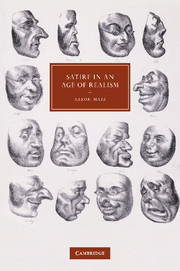Book contents
- Frontmatter
- Contents
- Preface
- Acknowledgments
- 1 Augustan satire and Victorian realism
- 2 Terminal satire and Jude the Obscure
- 3 George Gissing's ambivalent realism
- 4 The English critics and the Norwegian satirist
- 5 Truth and caricature in The Secret Agent
- Epilogue
- Notes
- Bibliography
- Index
- CAMBRIDGE STUDIES IN NINETEENTH-CENTURY LITERATURE AND CULTURE
1 - Augustan satire and Victorian realism
Published online by Cambridge University Press: 04 April 2011
- Frontmatter
- Contents
- Preface
- Acknowledgments
- 1 Augustan satire and Victorian realism
- 2 Terminal satire and Jude the Obscure
- 3 George Gissing's ambivalent realism
- 4 The English critics and the Norwegian satirist
- 5 Truth and caricature in The Secret Agent
- Epilogue
- Notes
- Bibliography
- Index
- CAMBRIDGE STUDIES IN NINETEENTH-CENTURY LITERATURE AND CULTURE
Summary
LIMITS AND ENDINGS
In the last years of the nineteenth century, English critics found themselves reaching a tentative consensus: the school of fiction called “realism” was finally coming to an end. Imported mostly from France, later propagated by disciples of Zola and French naturalism, debated endlessly in the British press, so-called realism had – in the span of only ten or twenty years – conquered the landscape of English fiction and become the dominant mode. But it was now in decline, the victim of its own excesses.
Edmund Gosse, omnipresent critic of the era, ascribed this decline to “The Limits of Realism in Fiction”: this was the title of his 1890 essay, later published in the 1893 collection Questions at Issue. Realism to Gosse largely meant Zolaesque naturalism and its progeny, full of rules and dogma: “it is to be contemporary; it is to be founded on and limited by actual experience … to paint men as they are, not as you think they should be.” But as Gosse's title announced, and as he reiterated throughout the essay, this kind of writing had hit a wall. “There are limits to realism, and they seem to have been readily discovered by the realists themselves … in trying to draw life evenly and draw it whole, they have introduced such a brutal want of tone as to render the portrait a caricature … in their sombre, grimy, and dreary studies in pathology, clinical bulletins of a soul dying of atrophy, we may see what the limits of realism are.”
- Type
- Chapter
- Information
- Satire in an Age of Realism , pp. 1 - 36Publisher: Cambridge University PressPrint publication year: 2010



